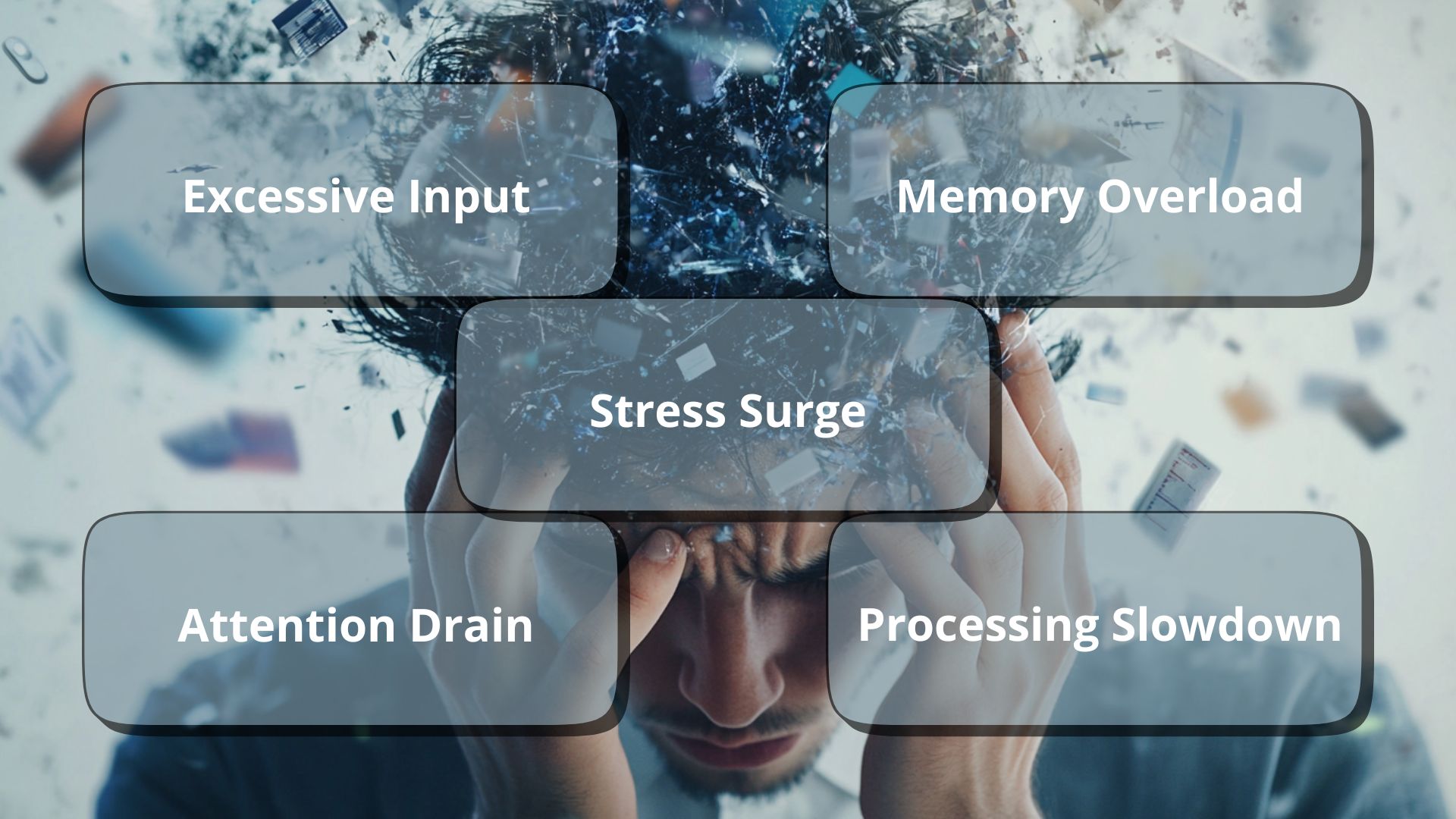The 21st century has brought rapid technological development and overwhelming amounts of information that hurt our ability to concentrate. The term “information fatigue syndrome” is increasingly used to describe this modern problem. Information overload causes sudden mood swings, leading to irrational decisions and actions. The brain becomes oversaturated with information and enters a state of anxiety. This results in an inability to adequately process the necessary amount of incoming data. Chronic multitasking weakens attention span and decision-making skills. The prefrontal cortex, responsible for executive functions, becomes overtaxed. This can diminish mental performance and lead to cognitive overload.
Notifications and endless digital stimuli are key factors that keep the brain in a heightened state of alertness. This disrupts deep thinking and problem-solving. Prolonged exposure to digital overload may even alter neural pathways, leading to reduced productivity and mental fatigue. Understanding these effects is crucial in a tech-driven world. Recognizing overload enables us to take steps to protect our brain health. Mindful technology use can mitigate these risks and improve mental performance.
The Cognitive Cost of Constant Multitasking
Constant multitasking taxes the brain, leading to cognitive overload. This state reduces brain efficiency and causes information fatigue. Below are the key multitasking risks:
- Impaired Focus: Multitasking divides attention, and the brain struggles to concentrate on a single task. This condition reduces task accuracy and quality.
- Memory Decline: Rapid task-switching disrupts memory formation. Short-term memory weakens, making it harder to retain information.
- Reduced Productivity: Multitasking slows task completion. The brain wastes energy switching between tasks, lowering overall efficiency.
- Increased Stress: Cognitive overload triggers stress responses. Elevated cortisol levels harm brain health. Chronic stress leads to mental exhaustion.
- Decision Fatigue: Constant decisions in multitasking drain mental resources. Poor choices become more likely. Judgment and problem-solving suffer.
- Information Fatigue: Excessive digital input overwhelms the brain. Processing endless data leads to mental fog, hindering clear thinking.
- Weakened Executive Function: The prefrontal cortex, vital for planning and focus, becomes overworked. This impairs cognitive control and self-regulation.
- Burnout Risk: Persistent cognitive overload leads to burnout. Mental fatigue accumulates, lowering motivation and resilience.
- Sleep Disruption: Engaging in multitasking with screens before bed can negatively impact sleep quality. Poor sleep reduces cognitive performance further.
- Neural Strain: Chronic multitasking may alter brain wiring. Over time, neural pathways adapt to shallow processing, making deep thinking harder.
These risks highlight how multitasking undermines brain efficiency. Information fatigue sets in as the brain struggles to keep up with the constant influx of information. Limiting multitasking and managing digital exposure can protect cognitive health and improve performance.
How Digital Distractions Reduce Attention Span
Digital distractions from smartphones and computers significantly shorten attention span. They disrupt thought patterns and make sustained focus difficult. Below are the key ways devices contribute:
- Constant Notifications: Alerts from apps interrupt focus. They cause the brain to shift attention repeatedly, fragmenting thought processes.
- Multitasking Demands: Devices encourage task-switching. Juggling emails, social media, and work reduces focus duration.
- Information Overload: Endless data streams overwhelm the brain. Processing excessive information fatigues cognitive resources.
- Screen Fatigue: Prolonged devices strain both the eyes and the mind. Mental fatigue and digital distractions set in, weakening concentration.
- Dopamine Triggers: Social media and games reward quick interactions. This pattern causes the brain to prioritize instant gratification over sustained effort.
- Hyperlinked Content: Clicking links disrupts linear thinking. The brain struggles to maintain coherent thought patterns.
- Reduced Deep Thinking: Devices promote shallow engagement. Skimming content replaces in-depth analysis, shortening focus.
These factors show how digital distractions erode attention span. Devices train the brain for brief, fragmented interactions. Over time, this weakens the ability to concentrate for extended periods. The prefrontal cortex, responsible for focus, becomes less effective. Thought patterns become erratic, impacting productivity and mental clarity.
Studies suggest that frequent device use is strongly linked to shorter attention spans in children and adults. To counter this, limiting notifications, setting device-free times, and practicing mindfulness can help. Focused, single-task work strengthens attention and restores coherent thinking. Managing digital distractions maintains a healthy attention span in a tech-driven world.
The Hidden Toll on Brain Plasticity
Constant task-switching strains the brain and leads to mental overload. This impacts the brain’s ability to adapt, altering brain structure and reducing cognitive flexibility. Below are the key ways it happens:
- Neural Rewiring: Frequent switching trains the brain to focus on shallow tasks. Neural pathways adapt to rapid shifts, weakening the ability for deep processing.
- Reduced Synaptic Growth: Cognitive overload hinders the formation of new synapses. The brain struggles to adapt to new tasks.
- Prefrontal Cortex Strain: Task-switching overworks the prefrontal cortex, reducing its efficiency and limiting flexible thinking.
- Attention Fragmentation: Constant shifts cause attention to fragment, weakening the brain’s ability to reorganize for complex tasks.
These changes show how task-switching reshapes the brain. Chronic cognitive overload prioritizes quick reactions over sustained focus. Over time, neural circuits favor fragmented processing, reducing cognitive flexibility. The brain becomes less adept at adapting to new challenges.
Prolonged multitasking shrinks gray matter in attention-regulating areas, impairing problem-solving and learning. To protect brain plasticity, limit task switching, practice single-task focus, and take regular breaks. These steps reduce cognitive overload and support healthy brain adaptation.
Understanding Cognitive Overload in a Digital World
Information fatigue resulting from digital overload can overwhelm the brain, harming brain health. This phenomenon, known as cognitive overload, disrupts neurological processing. Below are the key ways it occurs:
- Excessive Input: Endless digital data floods the brain, which struggles to filter relevant information.
- Memory Overload: Excessive information impairs short-term memory, weakening recall and retention.
- Stress Surge: Overload triggers the release of cortisol. Chronic stress damages brain health.
- Attention Drain: Constant stimuli reduce focus. The brain becomes fatigued, leading to information overload.
- Processing Slowdown: The brain’s processing speed drops, and decision-making becomes sluggish.
Cognitive overload stems from relentless digital input. Smartphones, apps, and notifications bombard the brain with overwhelming amounts of data. This taxes the prefrontal cortex, which is vital for focus and decision-making. Over time, information fatigue sets in, causing mental fog and reduced clarity. Neurological processing slows as the brain struggles to prioritize tasks.
Excessive information reduces neural efficiency, impacting learning and problem-solving. Prolonged exposure may weaken neural connections, harming brain health. To combat this, limit screen time, prioritize tasks, and take regular breaks. Mindful digital habits reduce overload and protect neurological function while restoring cognitive clarity in a digital world.
Reversing the Damage: Strategies for Recovery
Information fatigue from digital overload can harm attention span and memory. Below are strategies to reverse the damage:
- Limit Notifications: Turn off non-essential alerts to reduce interruptions and preserve focus.
- Single-Task Focus: Work on one task at a time to strengthen attention span and cognitive clarity.
- Digital Detox: Schedule device-free periods daily to combat information fatigue and refresh the mind.
- Mindfulness Practice: Meditate for 10-15 minutes daily to enhance focus and reduce mental clutter.
- Sleep Hygiene: Avoid screens before bed. Quality sleep restores memory and cognitive function.
- Cognitive Training: Use puzzles or memory games. These exercises boost attention and mental agility.
- Physical Activity: Engage in 30 minutes of exercise daily. This improves brain blood flow, aiding memory recovery.
These strategies counter information fatigue and restore attention span. Limiting digital exposure reduces cognitive strain. Mindfulness and sleep rebuild neural pathways for better focus. Exercise and cognitive training enhance brain plasticity, improving memory. Consistent practice of these habits can help reverse the effects of digital fatigue. Studies show that single-tasking and mindfulness improve attention within weeks. Prioritizing these steps fosters long-term cognitive health and resilience in a digital world.
Creating Healthier Digital Habits for Brain Wellness
Adopting healthier habits helps reduce digital distractions and supports positive brain changes for long-term brain health. Below are practical steps to enhance digital behavior:
- Set Screen Time Limits: Use apps to limit daily device usage to minimize digital distractions and cognitive strain.
- Establish Tech-Free Zones: Keep devices out of bedrooms and dining areas. This promotes better sleep and focus.
- Practice Deep Work: Dedicate 90-minute blocks to single tasks to strengthen focus and counter negative brain changes.
- Use Focus Tools: Activate “Do Not Disturb” or focus modes to reduce digital distractions during work.
- Follow the 20-20-20 Rule: Every 20 minutes, look 20 feet away for 20 seconds to prevent eye strain and mental fatigue.
- Curate Notifications: Allow only critical alerts. This lowers cognitive load and distractions.
- Engage in Offline Activities: Read physical books or keep a journal. These foster healthy brain development and mental clarity.
These steps help manage digital distractions and promote brain wellness. Limiting screen time preserves cognitive resources. Tech-free zones encourage better sleep, which is vital for memory consolidation. Focus tools and deep work train the brain for sustained attention, countering brain changes that favor shallow processing. Studies show that reducing notifications can improve focus within days.
Offline activities, such as reading, strengthen neural pathways for deep thinking. Consistently applying these habits helps rewire the brain, improving cognitive flexibility and resilience. By prioritizing intentional digital use, you can protect long-term brain health and enhance cognitive performance in a tech-driven world.












I've given up... the stress her office staff has put me through is just not worth it. You can do so much better, please clean house, either change out your office staff, or find a way for them to be more efficient please. You have to do something. This is not how you want to run your practice. It leaves a very bad impression on your business.
Please, leave your review
Write a comment: